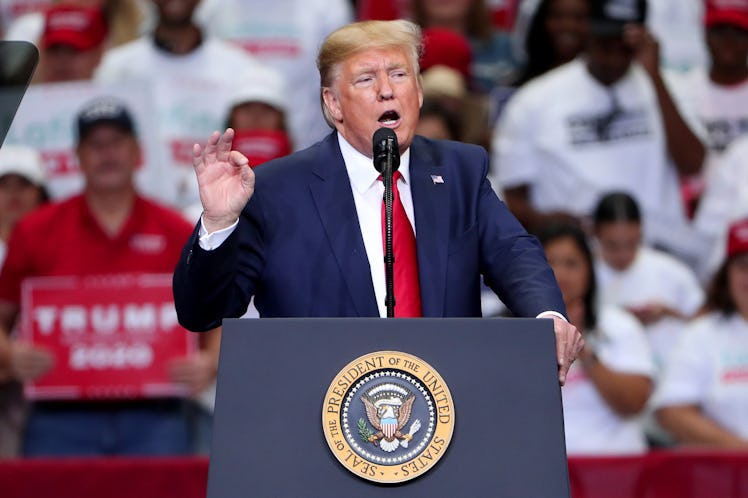
Donald Trump's Tweet About Impeachment & Lynching Is So Out Of Line
The House of Representatives is in the midst of an impeachment inquiry against President Donald Trump, prompting rage and criticism from the president. In a statement to Elite Daily, the White House characterized the inquiry as Democrats' attempt to "weaponize politics." But on Oct. 22, Trump took his impeachment comments to a new level by comparing the inquiry to lynching — and the backlash was swift. Democrats and Republicans alike pointed out that Trump's tweet about impeachment and lynching was completely unacceptable, especially due to the historical connotations of lynching in the United States. The White House did not immediately respond to a request for comment or clarification on Trump's tweet.
In recent weeks, Trump has responded to the House's impeachment inquiry with angry retorts and vitriolic criticisms of top Democrats. But Trump's latest response to impeachment proceedings has spurred bipartisan backlash.
"So some day, if a Democrat becomes President and the Republicans win the House, even by a tiny margin, they can impeach the President, without due process or fairness or any legal rights," Trump tweeted on Oct. 22. "All Republicans must remember what they are witnessing here - a lynching. But we will WIN!"
Elite Daily did not immediately hear back from the White House about Trump's decision to use the word "lynching." According to Bloomberg's Justin Sink, White House Principal Deputy Press Secretary Hogan Gidley defended Trump's lynching comparison by arguing that "the president wasn't trying to compare himself to the horrific history in this country at all." The White House also did not immediately respond to a request for comment concerning Trump's suggestion that he has not received "due process" in impeachment proceedings, despite the fact that said proceedings have not yet moved on to their trial phase in the Senate.
In response to the president's tweet, Democrats and Republicans alike denounced Trump's use of the word "lynching" to describe the impeachment process. Lynching is a form of extrajudicial "punishment," often violent execution, for alleged misbehavior — and in the United States, is inextricably tied with racial violence perpetrated against people of color as a form of domestic terrorism. According to the NAACP, there were 4,743 lynchings between 1882 and 1968, and 3,446 of the people who were lynched were black. The 1955 murder of Emmett Till became a prominent example of lynching; Till — a 14-year-old black boy — was lynched and killed after being accused of whistling at a white woman.
So for the president of the United States to liken impeachment proceedings to a lynching is extremely troubling, particularly given criticisms about Trump's own reactions to racial violence. After the Aug. 3 shooting in El Paso, Texas, which prosecutors are considering as a possible hate crime, Trump condemned "racism, bigotry, and white supremacy," but as Business Insider pointed out, he and his administration have downplayed the ongoing rise of white nationalism. In 2017, for example, Trump blamed "many sides" for the violence that broke out during a white nationalist rally in Charlottesville, Virginia, rather than unilaterally condemning those who had organized the rally. And just this year, the president published a series of tweets telling four progressive congresswoman of color to "go back," even though all are U.S. citizens. The White House did not previously respond to Elite Daily's request for comment on the remarks regarding Charlottesville or the congresswomen.
Criticism of Trump's Oct. 22 comment came from across the political spectrum, with Democrats like Minnesota Rep. Ilhan Omar and Illinois Rep. Bobby Rush denouncing Trump's comments as racist. Even Republicans like Illinois Rep. Adam Kinzinger slammed Trump's lynching remarks, arguing that “the painful scourge in our history has no comparison to politics, and @realDonaldTrump should retract this immediately."
Trump's latest reaction to the impeachment inquiry follows a long series of malignant comments the president has made in response to political actions against him. Trump previously likened former Special Counsel Robert Mueller's Russia probe as a "witch hunt," and more recently attempted to draw attention away from his Ukraine scandal by calling for an investigation of former Vice President Joe Biden and his son. However, Bernice King — the daughter of Martin Luther King, Jr. — noted on Twitter that Trump's "lynching" comments aren't a distraction like many of his previous remarks may have been, but rather, a troubling reflection of racism and American politics.